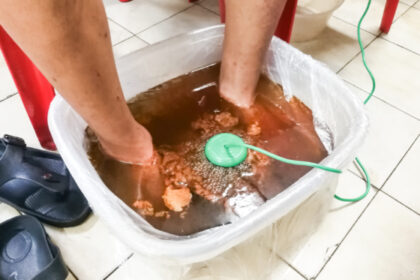Scented trash bags have become increasingly popular in recent years for their ability to contain foul garbage odors. But behind the masking fragrances lie hidden dangers that consumers should be aware of. Scientific research shows that the added perfumes and scents in these bags come with alarming health consequences.
Ingredients like phthalates and benzene have no place in a product used in our homes. The scented bags may smell better than taking out the garbage with typical plastic bags, but they present major risks to your health.
In this article, we will explore five scientifically-proven ways that scented trash bags can actually damage your health. The invisible chemicals emitted from these fragranced bags can cause anything from respiratory irritation to hormone disruption to cancer.
Here’s an in-depth look at the hazardous effects of scented garbage bags and why this smelly convenience may be too high a price to pay for your overall wellbeing. The next time you buy trash bags, you may want to think twice before choosing a scented option.
Whats The Obsession With Scented Cleaning Supplies
The obsession with scented cleaning products like scented trash bags comes down to a few key factors. Firstly, fragranced products help mask unpleasant odors from things like garbage or dirty laundry. The added perfumes provide a more pleasant smell compared to the bad odors they conceal.
Secondly, the scents give us an enhanced perception of cleanliness. Even if the cleaning product isn’t any more effective, the fragrance tricks our brains into thinking the environment is cleaner. We associate certain smells like lemon with the idea of clean.
Additionally, heavily marketed scented products have created a norm and habit for many consumers. Brands have told us lavender-scented disinfectants or spring flower-scented detergents are what clean smells like. So we grow accustomed to buying into these norms.
There’s also a feel-good factor to nice scents that provides a temporary pleasant psychological boost. Finally, scented sprays and fragrances help dissipate or cover up unwanted odors more quickly than unscented alternatives. So in summary, the obsession is driven by odor masking benefits, positive clean scent associations, feel-good factors, and effective fragrance marketing.
What Are Scented Trash Bags Made Of?
The 2 main components of scented trash bags are:
Plastic
- The plastic used is typically LDPE as mentioned. A major concern is that these plastics often contain phthalates, which are chemical plasticizers added to make the LDPE more flexible. Phthalates are controversial because they can leach out of plastics and have been linked to endocrine disruption and developmental issues.
Fragrances:
- The synthetic fragrances contain compounds like limonene, linalool, alpha-pinene, and the carcinogen benzene. Benzene can be present due to reactions between the fragrance chemicals. Exposure to benzene can occur through inhalation as it off-gasses from the plastic.
- Many fragrance compounds are derived from petroleum sources. There are concerns about lung irritation, allergies, and airway issues caused by chemicals emitted from these synthetic fragrances.
So in summary, potential health risks come from phthalate plasticizers in the LDPE plastic, carcinogenic benzene contamination in the fragrances, and general respiratory issues caused by synthetic fragrance off-gassing. These concerning chemical components demonstrate the hidden hazards of scented trash bags.
How Dangerous are Phthalates?
Here are some of the scientifically proven dangers of phthalates exposure:
- Reproductive toxicity – Several studies have linked phthalates to reproductive issues in men such as decreased sperm count and quality, lower testosterone levels, and genital development problems.
- Endocrine disruption – Phthalates mimic hormones in the body, interfering with the endocrine system. Specifically, they appear to disrupt male sex hormones like testosterone.
- Developmental effects – Exposure to phthalates during pregnancy and childhood has been associated with behavioral issues, lower IQ, obesity, asthma, neurodevelopmental delays, and anatomical defects in the reproductive system.
- Cancer risk – While not definitively proven as carcinogens, some phthalates have been linked to increased breast cancer risk and other tumor growth when exposure occurs.
- Liver toxicity – High levels of certain phthalates have shown liver damage, increased liver enzymes, and non-alcoholic fatty liver disease in animal studies.
- Lung irritation – Inhaling airborne phthalates can irritate the lungs and airways. This is a particular concern with plastics like scented trash bags.
So in summary, the well-established dangers of phthalates include disruption of reproductive hormones, developmental effects, liver toxicity, and cancer risk – especially when exposure occurs during critical periods of growth and development.
Dangers of Fragrance Chemicals Found in Scented Trash Bags:
Limonene:
- Respiratory irritation when inhaled, causing inflammation of the airways and asthma symptoms.
- Oxidizes in air to produce skin-sensitizing compounds and secondary pollutants like formaldehyde.
- Linked to kidney toxicity and tumors in lab animals at very high doses.
Linalool:
- Skin and respiratory irritant, can cause contact dermatitis.
- Allergen known to cause immune system reactions in sensitive individuals.
- Evidence of disrupting the endocrine system.
Alpha-pinene:
- Causes bronchoconstriction and respiratory issues when inhaled.
- Has an irritant effect on skin, eyes, mucous membranes.
- Neurotoxic effects like dizziness and difficulty concentrating.
Benzene:
- Known human carcinogen that can lead to leukemia and other blood cancers.
- Damages the bone marrow and reduces red blood cells.
- Toxic to the immune system.
- Linked to reproductive effects and chromosomal abnormalities.
In summary, these specific fragrance compounds have dangers like respiratory irritation, sensitization, endocrine disruption, neurotoxicity, and cancer risk (for benzene). The hazards are greatest with inhalation exposure over long periods of time.
5 Top Brands for Scented Trash Bags to Avoid
- Glade

- Hefty

- Color Scents

- Kirkland

- Members Mark

There is not a safe option for scented trash bags that I know of. If you want a safe way of making your garbage smell better, keep reading below.
Safe, Natural Ways to Make Your Trash Cans Smell Better:
- Essential oils – Add a few drops of essential oils like lemon, orange, peppermint or tea tree oil to a cotton ball. Place at the bottom of the trash before putting in a new bag to provide a fresh scent.
- Baking soda – Sprinkling some baking soda in the bottom of the trash can absorbs odors. You can also make a paste with baking soda and water and scrub down the trash can to deodorize it.
- Vinegar – White vinegar is a deodorizing hero. Occasionally rinse out trash cans with a diluted vinegar solution to kill odor-causing bacteria.
- Activated charcoal – Place charcoal briquettes or an odor-absorbing charcoal bag in the bottom of the trash to keep smells at bay without chemicals.
- Citrus peels – Toss leftover lemon, orange or grapefruit peels in the bottom of your garbage can to provide a natural citrusy smell.
- Compost frequently – Take compostable food scraps out regularly so they don’t sit and rot in your kitchen.
With some simple natural ingredients and habits, you can keep trash smells away without relying on synthetic fragrances. Focus on absorbing, killing, and masking odors in safe, non-toxic ways.
Scented trash bags may seem like an convenient way to keep foul garbage odors at bay. However, the hidden health hazards of the synthetic fragrances and chemicals in these bags present a concerning downside.
Plastics containing hormone-disrupting phthalates, respiratory irritants like limonene, and even carcinogens like benzene have no place in our homes. The risks to reproductive health, brain development, airway issues, and cancer simply aren’t worth any temporary scent-masking benefits.
Fortunately, there are safer, natural alternatives to make trash smell better without these dangers. Relying on ingredients like baking soda, vinegar, and essential oils can deodorize and freshen garbage cans without toxic exposures. Ditching the scented trash bags and returning to unscented plastic bags is an easy way to reduce health risks.
While it may require more diligence to manage odors through safer means, your overall wellbeing is worth that small effort. Don’t let the fragrance marketing hype distract you from the scientifically-proven damages of scented trash bags. Your health will thank you for making the switch back to unscented options.





